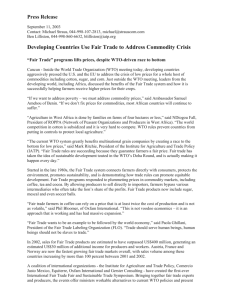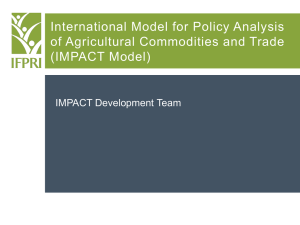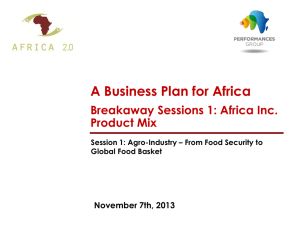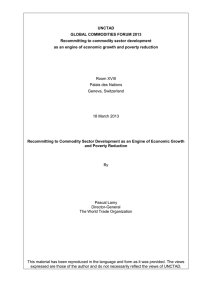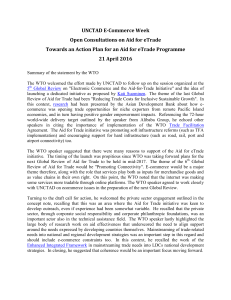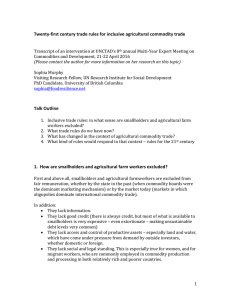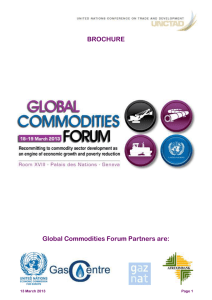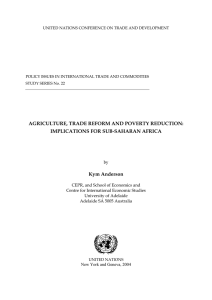By XIAOZHUN YI Deputy Director General of the World Trade Organization
advertisement
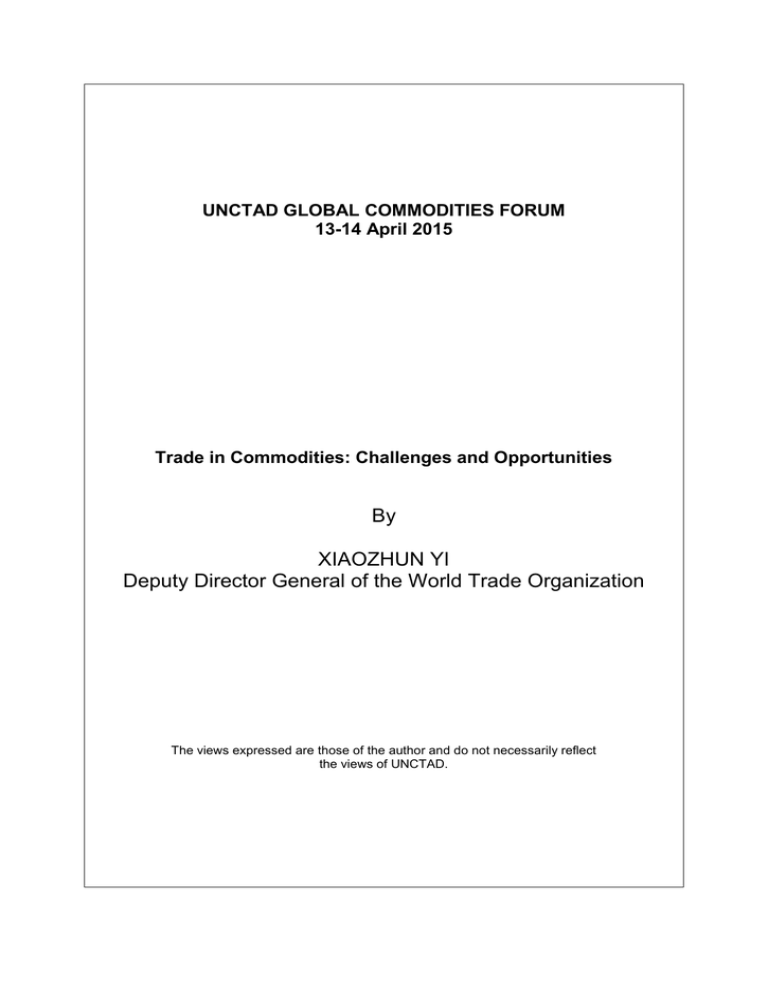
UNCTAD GLOBAL COMMODITIES FORUM 13-14 April 2015 Trade in Commodities: Challenges and Opportunities By XIAOZHUN YI Deputy Director General of the World Trade Organization The views expressed are those of the author and do not necessarily reflect the views of UNCTAD. 13 April 2015 UNCTAD GLOBAL COMMODITIES FORUM "Trade in Commodities: Challenges and Opportunities" 13-14 April 2015 INAUGURAL ADDRESS BY DDG XIAOZHUN YI Mr. Secretary-General, Excellencies, Distinguished Panel Members, Ladies and Gentlemen, I would like to express my sincere appreciation for UNCTAD's invitation to participate in the inaugural session of this edition of the Global Commodities Forum. Let me also congratulate you for drawing-up a wide-ranging programme of topical issues covering the energy, raw materials and agricultural fields. I am sure that, in addressing the theme selected for this Forum, participants will have ample opportunity to explore many of the trends, challenges and opportunities facing international commodity trade. From the WTO perspective, I would like to briefly recall where we come from. Successive rounds of multilateral trade negotiations have substantially improved world trade flows and locked-in market-based policy reforms under binding rules. Importantly, these rules have contributed to greater market transparency and stability. They have delivered guarantees for investors, producers and traders, as well as the policy space that governments require to move ahead confidently with trade, investment and development strategies. While trade is indeed a critical ingredient to economic growth, I think it is also essential to acknowledge that the relationship between trade and development is not only complex but also evolving. As reflected in the Forum's programme, in the last decade alone, we have witnessed a number of important trends that have had a bearing on this relationship. Among those relevant to commodity trade, I would like to mention: 1 the rapid economic and trade growth observed in many developing countries, combined with deeper regional integration, the growing importance of agricultural and non-agricultural commodity exports, underpinned by strong demand from emerging developing countries several episodes of price spikes and commodity price volatility (energy, metals, minerals, agricultural products), and more recently, the decline in oil prices the spread of quality and safety standards as well as costly certification schemes the emergence of global value chains higher environmental risks associated with the intensive exploitation of natural resources (deforestation, irrigation, soil erosion, green-house gas emissions, etc.) I must say that, as these dynamic forces have unfolded, affecting financial markets, food or energy supplies and prices, WTO Members have consistently renewed their confidence in a well-functioning multilateral trading system. But clearly, as the Director General stated a couple of day ago in Marrakech, ¨"the WTO has achieved a great deal over 20 years but there is much, much more to do". WTO rules need updating and strengthening, the process of reform and liberalization of trade policies must be maintained, and the multilateral trading system protected against any resurgence of protectionism. At the same time, the WTO must continue, as a matter of priority, to help developing countries to fully benefit from the multilateral trading system. This task is presently before the WTO membership in the framework of the Doha Development Agenda (DDA). The negotiations reached a significant milestone with the December 2013 Bali Ministerial Conference, and I will come back in a minute on one of its main achievements. WTO Members are currently working hard to agree on a work programme by July. This should constitute a decisive step towards concluding the round in a near future. The next critical meeting will be the 10th Ministerial Conference in Nairobi. Progress on the DDA can deliver significant results for developing countries, in particular in the agricultural sector which stands at the heart of the round. If we consider that agriculture employs more than half of the labour force in developing countries, the development and livelihood security dimensions of agricultural commodity trade become clear. 2 In a nutshell, our Members are trying to improve the market orientation of agricultural trade, establish stronger disciplines on agricultural domestic and trade policies to preclude further distortions. This objective should be achieved with positive results for developing countries, taking into account the food security of vulnerable importers as well as the livelihood security of commodity-dependent exporters. Given these diverse but complementary goals, it is fair to say that the agricultural trade reform package currently considered by WTO Members is of a multi-disciplinary nature. The WTO has also successfully deepened multilateral trade reform in an area that is equally relevant to commodity trade. I am of course referring to the Trade Facilitation Agreement delivered in Bali. Once implemented, burdensome customs procedures and documentation will be simplified, improving developing country competitiveness and their participation in global value chains, smoothing the movement of perishable agricultural commodities, and in the longer run, attracting investments and promoting regional trade. Members’ efforts to harmonize customs procedures will be accompanied by capacity building initiatives. Developing countries, particularly among the landlocked, will benefit from targeted technical assistance programmes to help them meet specific implementation objectives. To conclude, I am convinced that the 2015 edition of the UNCTAD's Global Commodity Forum will help us deepen our understanding of the many challenges facing commodity trade and their complex linkages to government policy responses. We are all looking forward to a fruitful debate in this highlevel multi-stakeholder platform that has gained wide recognition as a source of innovative thinking in this area. I also believe this kind of conversation is a pre-requisite to build up consensus on our respective contributions to global commodity governance and to deliver the sustainable growth anticipated by the emerging post-2015 development agenda. Thank you for your attention. 3

